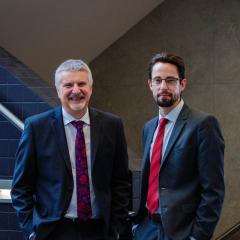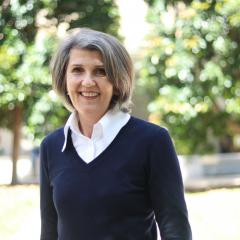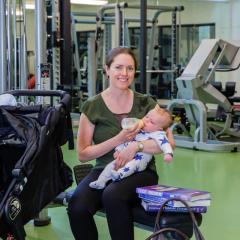Juggling the demands of a research career and motherhood is no easy feat, but it is a challenge Dr Shelley Keating is taking in her stride.
“No one gives you a roadmap to navigate this journey, but it is really about finding a good balance so my family and work both get the attention and dedication they deserve,” she explains.
Dr Keating’s research explores the role that exercise plays in the management of obesity and obesity-related chronic disease, with a focus on non-alcoholic fatty liver disease (NAFLD).
With the support of Diabetes Australia, Exercise and Sports Science Australia and an NHMRC Early Career Fellowship, Dr Keating is currently leading a study which is investigating if high intensity interval training (HIIT) can improve insulin sensitivity, fitness and other cardiovascular disease risk factors.
“Other than weight loss, there is no accepted therapy for improving non-alcoholic steatohepatitis (NASH)—a progressive and aggressive form of NAFLD—which is strongly linked to type 2 diabetes and cardiovascular disease.”
As part of the study, participants undertake short, intense bursts of exercise of around four minutes on a treadmill or exercise bike at near maximum capacity, interspersed with more moderate exercise.
“If our hypotheses are confirmed, our findings will assist in establishing high intensity exercise as a safe, feasible and effective therapy for improving insulin resistance and other cardiometabolic risk factors in patients with NASH. This would reduce the risk of developing type 2 diabetes and cardiovascular disease.”
Dr Keating believes exercise is a potent polypill for obesity, NAFLD and type 2 diabetes.
“We just need to learn ways to get more people taking it and to maintain it long-term so that the health benefits can be sustained,” she said.
The liver is a common denominator of Dr Keating’s research. She is also leading the exercise component of a collaborative study headed by Dr Ingrid Hickman assessing the feasibility of a 12-week cardio-protective lifestyle initiative for liver transplant recipients via telehealth-to-home.
“Obesity and cardio-metabolic complications present challenges to post-transplant care. Liver transplant recipients are a geographically dispersed group (30 per cent live in regional areas) at high risk of obesity and cardiometabolic complications,” she said.
“Patients often have low levels of lean muscle mass at the time of transplantation and exercise therapy may offer musculoskeletal and cardio-protective benefits.
“However, most liver transplant recipients receive little to no service, with no formal exercise prescription or support.
“Innovative telehealth services can offer equity of access to specialist state-wide post-transplant care including exercise intervention.
“If successful we hope to expand this work into other chronic conditions.”
Talking to Dr Keating it is clear how determined she is to successfully navigate motherhood alongside her goal to be an international leader in her field of research.
As the doting new mum of baby Edward, born in July 2018, she has already recognised that being flexible is paramount.
“I remind myself daily that I need to keep my expectations realistic and remember that it is okay to adapt what I’m doing when needed.
“I have quickly learnt that my plans to do a solid four – five hours of work while my newborn baby slept actually relied on having a baby who did in fact sleep!”
The ambitious young researcher believes there are distinct similarities between the skills required for being a mum, and the skills required for being a researcher.
“Effective time management and organisational skills are crucial in both cases, as is realising that even the best laid plans don’t always (or almost never!) go according to expectations.”
As an accredited exercise physiologist, Dr Keating is also well aware of the importance of self-care in these early stages of motherhood.
“Staying active and eating well allows me to optimise my energy to care for my newborn, as well as maintain the brain power required for my research. Pushing a pram up and down hills is also really good interval training,” she laughs.
Dr Keating is an inspiration to women in science, demonstrating that it is possible to simultaneously maintain a career and a family.
“While I’m still in the early stages of my academic career, I hope that I will one day be able to support and mentor other young researchers wanting to pursue a research career and motherhood.”
Words: Caroline Day



